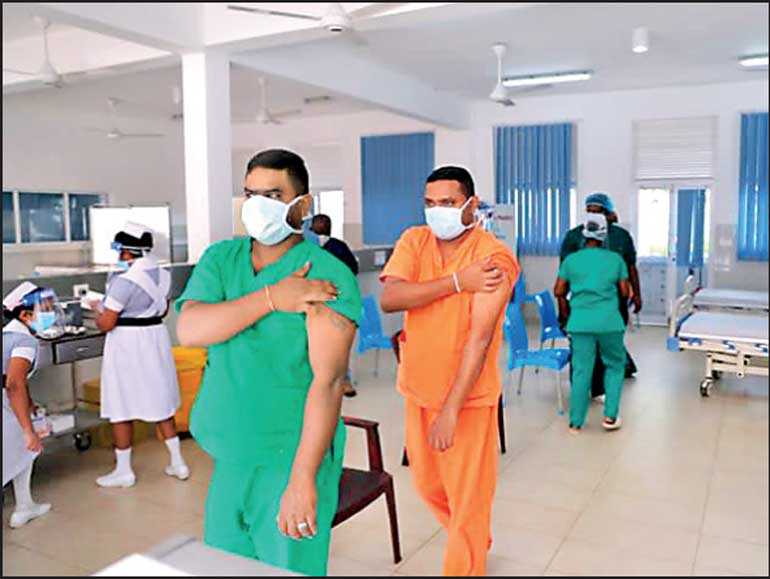Thursday Feb 19, 2026
Thursday Feb 19, 2026
Thursday, 11 March 2021 00:00 - - {{hitsCtrl.values.hits}}

People queue up to have their swab samples tested for COVID-19 in a residential neighbourhood in Colombo on 21 December – AP

Sri Lankan health workers leave after receiving COVID-19 vaccines in Colombo on 29 January – AP
By Marwaan Macan-Markar
asia.nikkei.com: Portugal’s colonial involvement in Sri Lanka ended in 1658, but the colonists left behind a vocabulary that is still audible in the ‘baila’ that reverberate across the South Asian island. The word, derived from ‘bailar,’ the Portuguese for ‘dance,’ refers to the catchy tunes that get Sri Lankans dancing at festive occasions such as wedding parties and cricket matches.
But this musical genre – also popular in the Indian coastal state of Goa, another former Portuguese colony – has also made waves through its lyrics, sometimes because of their pointed social commentary. Foolish public behaviour and the arrogance of the political class have become fair game in foot-tapping melodies that are taken in good part even by the pompous and pilloried as a nod to the country’s ability to laugh at itself.
A good example is ‘Wadakaha Sudiya,’ which poked fun at gullible people who fell for a local herbal brew of that name during a solar eclipse in the 1950s. The brew was supposed to be consumed in the midst of the eclipse; its selling point: Those who sipped it would acquire a fairer complexion. In fact, many who imbibed fell ill and were hospitalised. The baila made light of the episode, in the process also putting Ayurveda, an Indian alternative medical system that has a wide following in Sri Lanka, on the spot.
I was reminded of the enduring hold of ‘Wadakaha Sudiya’ on the public imagination during a visit to Sri Lanka in the last quarter of 2020. Quips about it lit up my mobile phone, illuminating growing concern about the emergence of what appeared to be an impending repeat of the 1950s tragedy.
The object of these fears was Dhammika Bandara, a sorcerer from Kegalle, a district in central Sri Lanka, who had become an overnight sensation by selling an herbal syrup that promised immunity from the coronavirus pandemic. Bandara, who once held a day job as a mason, claimed in the local media that he had received the recipe from Kali, a Hindu goddess. She had come to him in a dream, he said, and given him an elixir that would save the world.
His popularity laid bare the state of anxiety that had gripped the island. The number of COVID-19 cases, which had remained relatively low throughout most of 2020, began to climb rapidly in October, rising from a cumulative total of 3,380 with 13 deaths on 5 to 22 October, to 22,988 with 109 deaths by the end of November, according to the World Health Organization.
As pandemic fears grew, Bandara’s brew received a shot in the arm from the Government, which lavished State patronage on the sorcerer as if he was the answer to the country’s woes. He was widely promoted by the pro-Government media as a national hero – offering a spoonful of local magic as a more potent antidote than the limited treatment that the medical community could provide.
The country was even fed images of Bandara serving his brew to Government lawmakers in Parliament. Pavithra Wanniarachchi, the Minister of Health, provided the ultimate imprimatur: being photographed sipping a spoon of the magic potion.
This public embrace of sorcery over science by the Sri Lankan State resulted in a Pied Piper effect. Thousands of lesser mortals rushed to Kegalle, ignoring the country’s social distancing regimen and packing the streets where the smooth-talking Bandara was dispensing his brew (a mix of ingredients such as honey and nutmeg, according to local media).
I cannot fault these people for their faith in this syrup. After all, in Sri Lankan homes, it is common to alternate between western medicines and Ayurvedic brews, such as teas made with coriander seeds and ginger that are used to treat colds. There is, moreover, a thriving market for genuine Ayurveda products.
Other Asian societies have also succumbed to the lure of the supernatural over science. The spread of COVID-19 in Thailand prompted tens of thousands to travel to Wat Chedi, a Buddhist temple in the Southern Province of Nakhon Si Thammarat, to seek good luck from Ai Khai (Egg Boy), who is believed to be the spirit of an 18th century statue in the temple’s grounds. In Indonesia, shamans – or ‘dukuns’ in the local language – are a big draw in their role as traditional healers.
However, the Sri Lankan experience with COVID-19 sorcery is not ending well. In mid-January, Wanniarachchi tested positive for the virus, joining a junior minister who had also sipped the sorcerer’s brew and tested positive a few days earlier. At that point, the total number of cases had grown to 56,076. It has since continued to rise fast, reaching 83,870 with 483 deaths by 3 March, according to the WHO.
That dismal outcome is likely to make the two ministers fair game for a new baila. I shall stay tuned.
(Source: https://asia.nikkei.com/Editor-s-Picks/Tea-Leaves/Sri-Lanka-s-cautionary-tale-of-pandemics-and-sorcery)